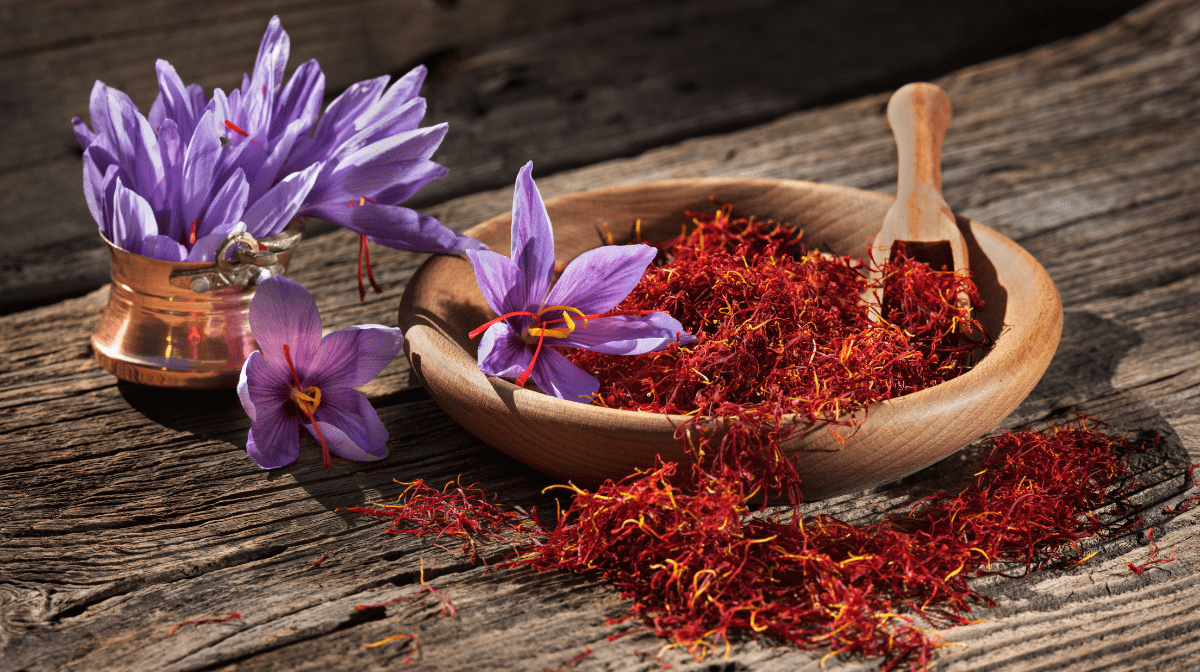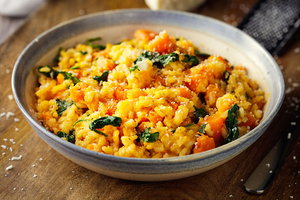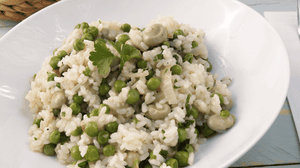
What does saffron do for you?
One of the driving forces that led humans to travel further than they ever had before, across land and sea, was the search for spices. Historically, the spice trade was the impetus for many dangerous boat journeys, where people survived on very little, with many not making it at all. So why did they give up so much for something so small? And what do spices do for us?
If you’re a chef, a naturopath, or just a foodie – the answer to this question is probably obvious. Most of us enjoy the flavours of a range of spices in our foods and our drinks, each and every day. In fact, it might be hard to imagine living in a world without all the spices we have on hand today.
But spices are not just flavour enhancers – many come with health benefits too.
Back when spices were a rarity, we used them to preserve our food, as well as to improve the flavour of what we ate. Using spices allowed us to make more dishes than what had previously been in our repertoire. Many spices were also sought after for their medicinal and healing qualities – the positive side effects of eating spices were well-known among those who travelled to obtain them. Some spices were thought to be mood enhancers, and others were used as aphrodisiacs.
Today, we know a bit more about how spices come with a range of health benefits. It may be due to their high antioxidant count or magnesium content, in some cases.
There are hundreds, if not thousands of spices available today, and we don’t have to travel too far to get them. Most of the standard spices live on our supermarket shelves, while others you may find at your local oriental grocery store. Each spice is unique in its health benefits, its colour and aroma, and its origin story. But in this article, we’ll be talking about one special golden spice called saffron.
What is saffron?
Saffron is an aromatic spice known for its vibrant colour, earthy – slightly sweet – flavour, and higher price point. Saffron has long been treasured as a culinary delicacy, and for its various health benefits.
A rich history
The story of saffron began many years ago, when people started harvesting the stigmas (small threads in the centre of a flower) from the small, crocus-like, purple saffron flowers which grew wild in the Mediterranean and Alegria. Saffron was treasured in ancient times – used as a dye, a flavour enhancer, and an aphrodisiac .[1]
Saffron is the colour of many Buddhist monks’ robes, and it is associated with purity and fire. Saffron even gets a mention in the Bible, along with frankincense and myrrh: “Nard and saffron, calamus and cinnamon, with all the trees of frankincense, myrrh and aloes, along with all the finest spices.” (Song of Solomon 4:14)[2]
Worth its weight in gold
Each crocus flower produces only three stigmas. These stigma threads, when dried and then crushed, become the precious saffron spice used in culinary dishes and traditional medicine.
The process has historically been, and still is, a labour-intensive one – as each flower’s stamen needs to be collected by hand, dried, and crushed to make saffron. It takes approximately 167 flowers to make just one gram of dry saffron.[3] For that reason, this golden-coloured spice is worth its weight in gold.
The health benefits of saffron
In ancient times, saffron was believed to be an aphrodisiac and a mood enhancer. Now, with the help of science, modern medicine, and clinical trials, we are able to put this – and other claims about the health benefits of saffron spice – to the test, figuring out why and how we may reap health benefits from using it.
Rich in antioxidants
Saffron contains several bioactive ingredients, including crocin, crocetin, safranal, and kaempferol. A key component of saffron is its antioxidant content. The major three antioxidants at work in saffron are crocin, picrocrocin, and safranal[4], which are present in both the saffron stigma and the petals.
In clinical studies on rats, the antioxidants crocin and crocetin were used as a preventative treatment for breast cancer, with some positive results.[5]
The reason antioxidants are often discussed by health experts is because they help to eliminate excess free radicals in the body. If you're scratching your head here, don't worry – all will be explained! Free radicals are molecules naturally produced by your body, but when there are too many of them, they can cause damage to bodily structures including DNA, and can lead to the body developing several diseases.[6] Antioxidants can slow and hinder these processes by free radicals, and keep their numbers in check, which is what makes them so beneficial to the body.[7]
When free radicals are left unchecked, the body can enter oxidative stress. Oxidative stress has been associated with major health conditions, including cancer and heart disease.[8] Because antioxidants can prevent oxidative stress and inflammation in the body, increasing the number of antioxidant-rich foods in your diet may help to support your health, and prevent the risk of developing these problems in the future.[9] Using saffron in your meals, drinks, and desserts is a great way to up your antioxidant intake.
The effects of saffron use on the brain and gut
Saffron extract has been shown to be effective in the support of mild to moderate depression in clinical trials.[10] There are some studies to show positive side effects of using saffron to ease the symptoms of major depressive disorder too, but further studies are needed.[11]
One study showed that taking saffron supplements increased dopamine production in the brain.[12] As a ‘feel-good’ neurotransmitter, increased dopamine in your brain may help you to feel happier and less depressed.[13]
Scientists have also used saffron to treat memory and learning impairments,[14] as well as nervous system disorders,[15] with some positive results.
As for whether saffron is an aphrodisiac – there is some research to suggest saffron may help with libido and sexual dysfunction in both men and women.[16]
The gut microbiome, a vast collection of microorganisms residing in our digestive tract, plays a pivotal role in our overall health and wellness. Recent scientific research has highlighted the crucial link between gut health and various aspects of our physical and mental health, including immunity, digestion, mood, and more.[17] Maintaining a diverse and balanced gut microbiome is essential for optimal health.[18]
Because saffron has both anti-inflammatory and antioxidant properties,[19] using saffron can have potential benefits for your mental wellness and gut health. Chronic inflammation can do serious damage to your mental wellness and gut health – several major diseases such as heart disease, depression, and Alzheimer's are associated with chronic inflammation.[20]
In one study, patients with coronary artery disease were given saffron extract and saffron supplements for obesity – with “promising results.”[21] If you’re trying to eat more vegetables, you can use saffron to make them taste better too – which can make eating healthier feel a lot easier.
Taking saffron supplements can make it easier to incorporate saffron into your daily routine. Always follow the recommended dosage and consult with your healthcare provider before starting any new supplementation regimen.
How to use saffron
Saffron is often used as a garnish, and is also present in some food colouring. Some essential oils are made from saffron extract, too.
When using saffron extract or saffron spice as a supplement for your health, always make sure to discuss this with your doctor first. If you are using saffron to help a major medical condition, it is important to make sure it is used only as a supplement alongside the main medications and treatments your doctor recommends. High doses of saffron can come with their own serious negative side effects, so it’s important to make sure you’re taking a healthy amount, too.
Cooking with saffron is a great way to incorporate it into your diet. Not sure where to start? Have a look at some recipes for popular dishes such as saffron rice, saffron chicken, and saffron tagine. Feeling adventurous? You can even try your hand at saffron ice cream!
Our Daily Calm capsules are ideal as they're enriched with saffron, vitamin B6 and Bifidobacterium longum 1714™, helping you to relax and support your emotional balance.
References:
[1] https://www.healthline.com/nutrition/saffron#_noHeaderPrefixedContent
[2] https://draxe.com/nutrition/the-top-14-herbs-of-the-bible/
[3] https://www.uvm.edu/~saffron/Old/Workshops/Saffron%20Workshop%202020/Saffron%20by%20the%20numbers%202020.pdf
[4] https://www.ncbi.nlm.nih.gov/pmc/articles/PMC4599112/
[5] https://www.sciencedirect.com/science/article/abs/pii/B9780128212776000064
[6] https://www.ncbi.nlm.nih.gov/pmc/articles/PMC3249911/
[7] https://www.ncbi.nlm.nih.gov/pmc/articles/PMC3249911/
[8] https://www.ncbi.nlm.nih.gov/pmc/articles/PMC3249911/
[9] https://www.medicalnewstoday.com/articles/327017#benefits
[10] https://pubmed.ncbi.nlm.nih.gov/26468457/
[11] https://pubmed.ncbi.nlm.nih.gov/24299602/
[12] https://www.researchgate.net/profile/Mina-Ranjbaran-3/publication/260080975_Aqueous_Extract_of_Saffron_Crocus_sativus_Increases_Brain_Dopamine_and_Glutamate_Concentrations_in_Rats/links/54a3d9ab0cf267bdb904868c/Aqueous-Extract-of-Saffron-Crocus-sativus-Increases-Brain-Dopamine-and-Glutamate-Concentrations-in-Rats.pdf
[13] https://www.healthline.com/health/happy-hormone
[14] https://pubmed.ncbi.nlm.nih.gov/26468457/
[15] https://www.medicalnewstoday.com/articles/327017#benefits
[16] https://www.medicalnewstoday.com/articles/327017#benefits
[17] https://www.betterhealth.vic.gov.au/health/healthyliving/gut-health
[18] https://www.betterhealth.vic.gov.au/health/healthyliving/gut-health
[19] https://www.ncbi.nlm.nih.gov/pmc/articles/PMC6567082/
[20] https://www.health.harvard.edu/staying-healthy/foods-that-fight-inflammation
[21] https://pubmed.ncbi.nlm.nih.gov/29391933/









